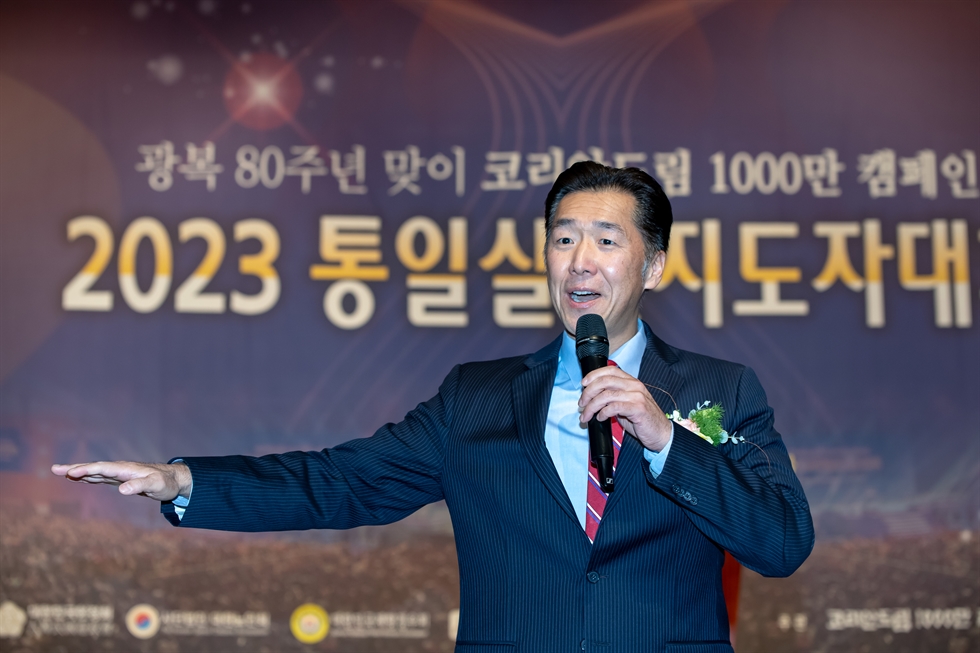NEW DELHI, India ― In the last few decades, South Korea and its neighboring countries have engaged in various diplomatic efforts to make North Korea abandon its nuclear ambitions, which threaten the peace and stability of the Korean Peninsula and the international community.
Under such efforts, numerous talks were held both at bilateral and multilateral levels. Some noteworthy agreements, such as the 2018 Pyongyang Joint Declaration, seemed to bring the two Koreas closer to achieving peace.
Nevertheless, to this day, Pyongyang still shows no signs of giving up its nuclear arms, in what it calls “self-defense” capabilities. In recent months, the reclusive regime has been ratcheting up tensions on the peninsula through a barrage of missile tests as well as verbal provocations toward Seoul and Washington.
Given the situation, Hyun Jin Preston Moon, the founder and chairman of the Global Peace Foundation (GPF), a Washington D.C.-based non-governmental organization, calls for a paradigm shift in inter-Korean policies, arguing that government-led approaches have not led to any fruitful results ― and they never will.
“In terms of missile shooting (by North Korea), there is nothing anybody can do. The South Korean government can’t do anything. The U.S. government can’t do anything about it,” he said during a joint interview with Korean media outlets in New Delhi, India, April 13.
The North shows a pattern of scaling up military provocations while a conservative administration is in power in South Korea, and once a liberal administration comes in, the two nations talk, Moon said.
“But are the talks real? Do they lead to anything fruitful?” he asked, mentioning that even after former president Kim Dae-jung, who won a Nobel Peace Prize for his Sunshine Policy toward North Korea, inter-Korea relations eventually got worse.
Stressing that diplomatic initiatives, bilateral talks and summits aimed at resolving security concerns surrounding North Korea’s nuclear weapons program have led to no progress, Moon called for a new paradigm in the Korean Peninsula to unify the two Koreas.
The activist believes that real progress will only be made when it is driven by ordinary people. After establishing the GPF in 2009, he has been campaigning for unification based on the founding ideal of Korea “Hongik Ingan,” which means “to live for the greater benefit of all mankind.”
Moon explained that major successful movements in Korean history such as the March 1 Independence Movement of 1919 and democracy rallies in the 1980s have come from the bottom up.
“Remember, nobody believed that the Berlin Wall would come down in 1990. Nobody believed that the Soviet Union would be dismantled. And that shows how a vision and idea rooted in high moral principles can really change the world.”
During the interview, which was held on the sidelines of the Global Peace Leadership Conference hosted by the GPF in New Delhi, Moon highlighted the significance of partnerships with India in his peacebuilding activities.
“India is going to be hosting G20. It is also going to be hosting the C20 as well, which is a civic initiative. These are very aligned with what I’m planning to do over the next three years in Korea,” he said.
“Also, India has a good relationship with both South and North Korea. It is the largest nation that has embassies in both the North and South. So the fact that we are holding the event here is of very great significance for them, too.”
He went on to say one of the goals of hosting the conference in India was to raise global awareness of the GPF’s grand project of gathering 10 million people so as to support unification by 2025.
In February this year, his foundation held a so-called 10 million People’s Korean Dream Rally for the 80th Anniversary of Korean Liberation, to gather 10 million people in Korea and overseas by 2025 who support unification. The year 2025 marks the 80th anniversary of Korea’s liberation from Japanese colonial rule, which ended in 1945.
In order to achieve his goal, Moon said he will focus on empowering the younger generations.
“The youth of Korea has been misled in terms of unification. Many of them believe that the cost of unification will be exorbitant and that they will bear the cost. But the opposite of all that is true,” he said.
According to Moon, the southern influx of North Korea’s population, a vast majority of whom are young people, will help resolve South Korea’s shrinking youth demographic and aging society, while the North will be able to benefit from the South’s economy and infrastructure.
When asked what makes him stay motivated as a leader of a major global organization, Moon replied, “seeking the truth and being honest.”
“What I keep on emphasizing is that dreamers are the ones that change the world. We all have to be a person who believes in truth, has conviction and shows moral courage,” he said.


Dr. Hyun Jin P. Moon was interviewed by Hyo-jin Lee for The Korea Times on the future of a unified Korean peninsula and the prosperity it will bring to the region and world. You can read the interview below or find the original interview here.